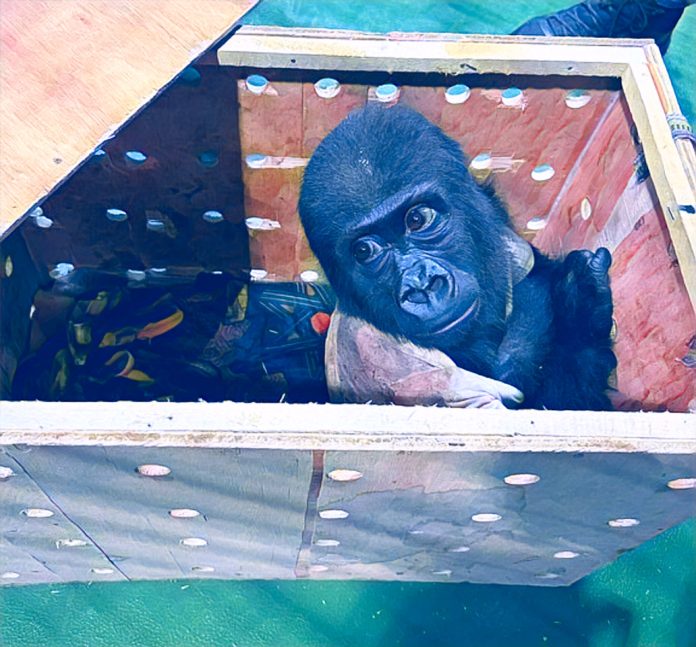Key Points
-
Nigerian NGO warns baby gorilla repatriation is being stalled.
-
Turkey seized to repatriate the baby gorilla repatriation despite calls.
-
The baby gorilla repatriation debate spotlights wildlife-trafficking issues.
The Pandrillus Foundation, a Nigerian group that works to protect wildlife, has criticised the Turkish government for not sending back a baby gorilla that was rescued earlier this year at Istanbul Airport. This has made the situation worse in terms of both diplomacy and ethics when it comes to wildlife trafficking.
Turkish customs officers stopped the primate, which is thought to be less than six months old, in December 2024 while it was being smuggled from Lagos, Nigeria, to Bangkok, Thailand.
Turkish police said that two foreign nationals who were trafficking the baby gorilla were caught after customs officers found it hidden in a wooden crate in the airport’s cargo area.
The fight to bring the baby gorilla home gets worse
At first, Turkish officials said they would work with Nigeria through CITES, the Convention on International Trade in Endangered Species of Wild Fauna and Flora, to make sure the animal got back to Africa safely. But the mood changed when the Istanbul Zoological Research Institute said that a DNA test showed that the gorilla did not belong to a species that lives in Nigeria.
The Nigerian NGO, which was co-founded by an American named Liza Gadsby, called the move “disappointing and illogical.” She said that Pandrillus had already set up places in Calabar, Cross River State, to keep the baby gorilla for a short time before moving it to a rehabilitation sanctuary in Cameroon called the Limbe Wildlife Centre, where it would join other rescued apes.
“We are very upset. Gadsby told reporters in Calabar that what the Turkish government is doing doesn’t make sense from a scientific or moral point of view. “This choice goes against CITES principles, which say that trafficked animals should be returned to their natural habitats or safe havens in their ecological range.”
The legal and moral aspects of bringing baby gorillas back home
The General Directorate of Nature Conservation and National Parks of the Turkish Ministry of Agriculture and Forestry said that the gorilla would stay at the Istanbul Zoo for “monitoring and welfare reasons.” Officials in Turkey said that sending the gorilla back to Nigeria would break the safety clause of the CITES convention because they couldn’t be sure of its genetic origin.
But wildlife experts in Nigeria don’t agree. Dr. Mohammed Bello, a conservation biologist at the University of Ibadan, said that the argument doesn’t make a moral point. “The principle stays the same whether the gorilla is Nigerian or not: the animal was taken from Africa. He said, “Its rehabilitation should happen in Africa.”
Pandrillus, which has been taking care of endangered primates like chimpanzees and drills for decades, says that Turkey’s position is a dangerous example.
Gadsby said, “Keeping the gorilla in Istanbul effectively rewards trafficking routes.” “It sends a message that transit countries can keep animals that have been taken instead of sending them back to their natural habitat.”
Wider effects on protecting wildlife
The debate over sending the baby gorilla back home has shown that there are bigger problems with enforcing wildlife laws around the world and with the conflict between conservation politics and international diplomacy.
The Federal Ministry of Environment of Nigeria and the National Environmental Standards and Regulations Enforcement Agency (NESREA) have both said they want to work with CITES to make sure that Africa’s endangered species come back to the continent.
Peter Jenkins, co-director of Pandrillus and a long-time advocate for wildlife, says that the case is not just about one animal but also about the integrity of conservation law. He said, “What’s the point of having CITES if every transit country keeps what it takes?”
The United Nations Environment Programme (UNEP) says that wildlife trafficking is still one of the most profitable illegal trades in the world, worth more than $20 billion a year. Africa and Southeast Asia are two of the most important places for trafficking exotic animals like parrots, pangolins, and apes.
The baby gorilla is still being taken care of by the Istanbul Municipality Zoo as of late October 2025, even though Ankara and Abuja are still talking about it.
The baby gorilla repatriation issue has become a symbol for Pandrillus and its partners of a bigger fight about ethics, responsibility, and whether the world will stand by the principles of wildlife justice instead of bureaucratic convenience.



